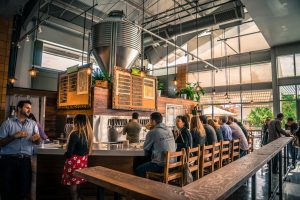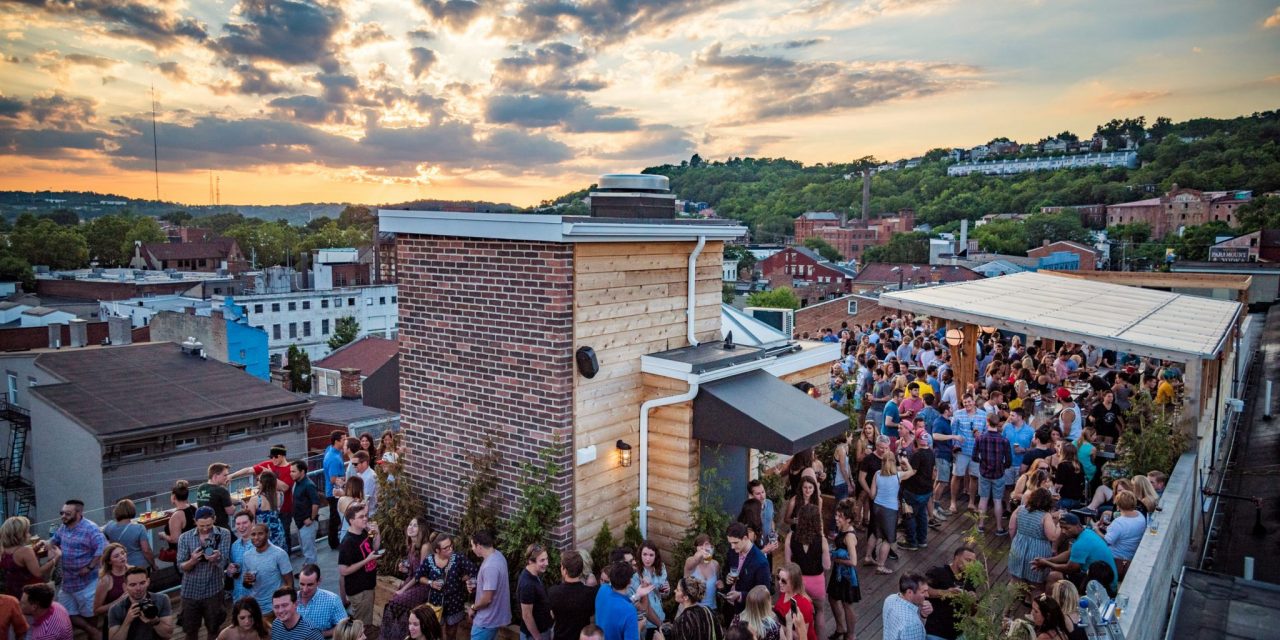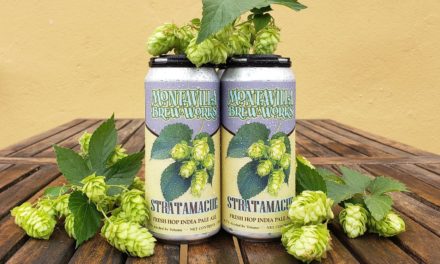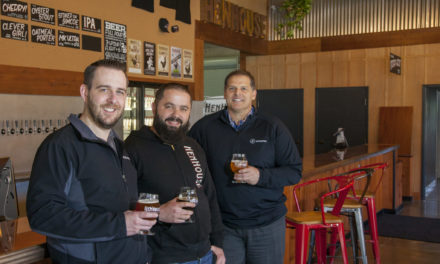
Despite being purchased by Heineken, Lagunitas continues to operate independently
A few years back, when Petaluma, Calif.-based Lagunitas Brewing was opening up a new production facility and taproom in Chicago, Ill., the question of how the company would maintain its unique culture through that expansion was crucial. So, too, was how to maintain the Lagunitas experience for guests. Director of Communications Karen Hamilton posed the task as: “We’re taking a brewery that we started in California, and we’re opening up a facility halfway across the United States: Is it going to be the same?”
The brewery currently has a third production facility under construction in Azusa, Calif.; along with outposts in Seattle, Wash.; Portland, Ore.; and Charleston, S.C. In May of this year, Lagunitas also announced it had been fully acquired by Heineken (the two had entered a joint venture agreement in 2015 when the global company purchased an initial 50 percent stake).

“If you lose your people, then you don’t really have anything left. You lose your culture.” —Karen Hamilton, Lagunitas Brewing
Throughout expansions and acquisition, a core team within Lagunitas has paid close attention to how the company is evolving. Ron Lindenbush has been with Lagunitas since it was eight months old and today serves as chief cultural officer, a role that increasingly has him giving first-hand accounts of company stories and lore to new employees. Meanwhile, Hamilton is in charge of syncing internal and external communications, while managers and all employees work as a family unit to ensure core values are properly communicated and that employees remain invested.
Considerations of culture repeatedly point back to people. “The people are most important,” Hamilton says of these transition periods. “If you lose your people, then you don’t really have anything left. You lose your culture.”
The entire Lagunitas team is connected via an online communications portal (called Smoke Signals), which lets employees around the world communicate with one another via blogs, emails, and company news. Regarding the Heineken deal, Hamilton says a crucial consideration was finding the right partner. “We didn’t take the highest bidder,” she says. “We decided to work with the one that seemed most like us.”
Both companies were family owned. Heineken demonstrated it was genuine about letting Lagunitas continue to operate independently, and the deal offered the craft brewer opportunity for overseas expansion—and an acceptable cultural environment.
Hiring for Satellites
Fieldwork Brewing Co. out of Berkeley, Calif., has been coping with different (albeit related) challenges of expansion. The company opened in February 2015 and now has five locations across Northern California, including recently added spots in Monterey and San Mateo. The original Berkeley location handles brewing for all its taprooms and draft accounts.

Fieldwork Brewing’s
frequently rotating beers
and a properly educated
staff keep customers
coming back.
“We always knew we’d be rotating the beer frequently—that we wouldn’t have a core lineup,” explains Fieldwork’s CEO and co-founder Barry Braden. “Our ability to offer beer directly in our Berkeley location and our four satellite taprooms is a way to do the best job we can, in terms of getting consumers the freshest beer possible, as well as being able to talk to them about it in some intelligent way.”
Fieldwork recently topped 100 employees, and maintaining a high level of service is a challenge for the fast-expanding brewery. “The hardest thing is hiring—making sure we have enough people to support the level of customers we’re welcoming through the doors,” he says.
The Fieldwork model, in which each taproom gets an allotment from an ever-changing lineup (created by head brewer Alex Tweet), lets the company avoid many of the constraints that could result from having, say, a high-volume flagship that requires always-increasing tank space. As Braden puts it, “Alex gets to brew whatever he wants to brew.”
As a brewery focused on varied, frequently rotating beers and a properly educated staff, establishing these central company values from the beginning has made those expansions smoother. “This was always part of our model,” Braden confirms. “We knew where we were going.”
Mikkeller, a chain of microbreweries started in Denmark, features 33 different locations spread over nine countries (at latest count). By necessity, things are a touch more decentralized. “Our philosophy with the bars is that we never want to do copies of our existing places,” explains Mikkeller’s Operations Manager Jacob Alsing. “People should expect a new experience every time they walk into [a different] one.”
Much of the Mikkeller experience is visually driven, and Alsing points to core elements like clean design and a Scandinavian vibe—“with a couple of exceptions”—as well as high-quality products throughout. “We have strict rules in the design,” he says. Given the far-flung locations of the Mikkeller outposts, managers are brought to Denmark for training and given extensive support, as they’ll serve as crucial contacts between company headquarters and their locations.

“We had never taken time to verbalize who we are, as a company.” —Dennis Kramer-Wine, Rhinegeist Brewing
Deliberate Growth
For many breweries and other beverage producers, periods of expansion (and culture-preservation concerns) end up revealing that the company’s core values and brand messaging could benefit from a bit of work. This has proven true for both Rhinegeist Brewery in Ohio and Hawaii’s Maui Brewing Co., each of which recently faced challenges related to growth.
Dennis Kramer-Wine, who’s been with Rhinegeist since its start in 2013, was formally assigned the role of director of culture this past January. The brewery, located on the northern edge of downtown Cincinnati, opened in a vast (more than 100,000 square feet) space that included plenty of room for a taproom and future expansion. Kramer-Wine had previously worked for an employee-owned company in Colorado, where values such as transparency and maintaining a democratic work environment were, literally, written into the business plan. At Rhinegeist, though, “Culture wasn’t written into our business plan.” His new job is, essentially, to amend that situation.
Rhinegeist has grown from 3,500 barrels its first year to about 58,000 barrels in 2016; this resulted in upward of 80 new hires in a single year. “With the rapid growth we’ve seen, there are people that grew into their roles via tenure only,” he points out. “We had people adding their own staff—which are critical decisions to make.”
One stipulation for Kramer-Wine’s new role was that he would have close access to the company’s main co-founders, so he could work directly with them on elements such as refining core values and better ensuring proper discourse between levels of management. He also sought increased feedback from the employee side.
“Within the first few days, people started approaching me to ask, ‘Hey man, can we talk?’” It was an eye-opening experience that highlighted the fact not everyone was happy with their place in the company—or the company in general.
“Even though we thought we were doing the right things, hitting targets on paying well, giving good benefits, and so on, we just needed to take a closer look. We had never taken time to verbalize who we are, as a company.” Ultimately, says Kramer-Wine, digging into and better articulating the company’s core values and culture has helped to improve hiring methods as well as the brand’s messaging as it expands into new markets.

Revisiting its core elements has helped Maui Brewing find better hires and facilitated better communication of the components of craft beer and aloha that steered its culture from the start.
Building consensus
Maui Brewing Co. started in 2005, brewing around 320 barrels, and expects to brew 53,000 barrels this year; it currently has more than 400 employees across three locations. Its latest venture, a restaurant in Waikiki, opened in February, and another restaurant will open at the brewery’s original location in early 2018. Co-owner Garrett Marrero says of that success, “If there’s one thing we’ve struggled with the most, it’s preservation and communication of culture, especially as you experience a large and rapid growth curve.”
Marrero and co-owner Melanie Oxley (who were named 2017 Small Business Persons of the Year by the U.S. Small Business Administration) took the Waikiki expansion as an opportunity to focus the Maui brand on a number of fronts, including refining the logo, defining core values and developing a clear vision statement. They included restaurant partners, along with an outside design firm, in the process. “We all did it together, so when we opened in Waikiki and we prepared to tie that business to the Oahu operations, we were all singing the same tune.”
Revisiting those core elements has helped the company find better hires and facilitated better communication of the components of craft beer and aloha that steered the company’s culture from the start. “We definitely spend a lot more time on the who we are, why we are, and what we do—before [a new employee] even gets into actual work,” says Marrero. “You don’t get to be a bartender or a server, communicating our vision to our craft-beer-drinking guests, without having a thorough understanding of the company.”
He adds, “Expanding is probably the most difficult thing to do while still maintaining the spirit and culture. It’s not something you do once, it’s something you have to do every day.”











